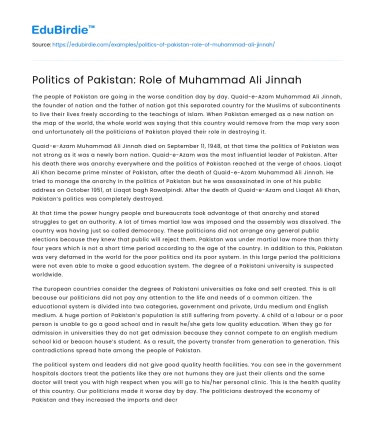Introduction
Muhammad Ali Jinnah, the founding father of Pakistan, played a pivotal role in shaping the political landscape of South Asia. As the leader of the All-India Muslim League, Jinnah's political acumen and unwavering dedication to the cause of Indian Muslims led to the creation of Pakistan in 1947. His vision for a separate nation was not merely a reactionary stance but a strategic maneuver to address the socio-political challenges faced by Muslims in a predominantly Hindu India. Jinnah's leadership style, characterized by negotiation and diplomacy, was instrumental in uniting disparate Muslim groups under a common cause. This essay examines Jinnah's political strategies, his vision for Pakistan, and the enduring impact of his leadership on contemporary Pakistani politics. By analyzing his role, we can better understand the complexities and challenges of nation-building in a post-colonial context.
Jinnah's Vision and Political Strategy
Jinnah's vision for Pakistan was rooted in the concept of a separate Muslim identity within the Indian subcontinent. His political strategy was grounded in the two-nation theory, which posited that Muslims and Hindus constituted distinct nations with different cultural, religious, and social customs. This idea gained traction as communal tensions escalated in the 1930s and 1940s. Jinnah articulated his vision during the Lahore Resolution in 1940, where he called for "independent states" for Muslims in northwestern and eastern zones of India. This marked a significant shift from his earlier stance of advocating for Hindu-Muslim unity and highlighted his adaptability as a leader.
Save your time!
We can take care of your essay
- Proper editing and formatting
- Free revision, title page, and bibliography
- Flexible prices and money-back guarantee
Jinnah's adeptness in political negotiation was evident in his dealings with the British colonial authorities and the Indian National Congress. He leveraged his legal training and oratory skills to present a compelling case for Pakistan, emphasizing the need for safeguards for Muslim rights in a potential Hindu-majority India. His strategic alliances and pragmatic approach enabled the Muslim League to emerge as the dominant representative body for Indian Muslims. According to biographer Stanley Wolpert, Jinnah's "personal charm, perseverance, and political astuteness" were crucial in achieving Pakistan's creation.
Challenges and Counter-Strategies
Jinnah's journey was fraught with challenges, including skepticism from both the British and Hindu leaders. One major counter-argument against the creation of Pakistan was the fear of sectarian violence and economic instability. Critics argued that partition would lead to mass displacements and exacerbate communal tensions. However, Jinnah countered these arguments by advocating for a peaceful transfer of power and emphasizing the economic viability of a separate Muslim state. He envisioned Pakistan as a secular and democratic state, where religious freedoms would be safeguarded for all communities.
Despite facing criticism, Jinnah remained steadfast in his pursuit. He addressed concerns about governance by proposing a federal structure with significant autonomy for provinces. His pragmatic approach is exemplified by his willingness to negotiate with Congress leader Jawaharlal Nehru, although these negotiations ultimately failed. Jinnah's ability to adapt and respond to changing political dynamics was a testament to his leadership. Historian Ayesha Jalal notes that Jinnah's "pragmatism and foresight" were critical in navigating the complex political terrain of the time.
Legacy and Impact on Modern Pakistan
Jinnah's legacy continues to shape the political discourse in Pakistan. His vision of a progressive, inclusive, and democratic state remains a benchmark against which contemporary political developments are measured. Jinnah's emphasis on constitutionalism and rule of law laid the foundation for Pakistan's legal and political institutions. However, the realization of his vision has been challenged by political instability, military coups, and religious extremism. The tensions between Jinnah's secular ideals and the rise of religious conservatism highlight the ongoing struggle to define the national identity of Pakistan.
Jinnah's leadership also serves as a model for contemporary leaders facing the challenges of governance in a diverse and multi-ethnic society. His ability to unite disparate groups under a common cause underscores the importance of inclusive leadership. As Pakistan continues to navigate its political evolution, Jinnah's legacy serves as a reminder of the country's foundational principles and the need for visionary leadership.
Conclusion
In conclusion, Muhammad Ali Jinnah's role in the politics of Pakistan was transformative, characterized by his strategic vision, diplomatic acumen, and unwavering commitment to the cause of Indian Muslims. His leadership played a crucial role in the creation of Pakistan, offering a new direction for the subcontinent's Muslims. While his vision for a secular and democratic Pakistan faces challenges, his legacy remains a guiding light for the nation's political journey. Jinnah's ability to navigate complex political landscapes and unite diverse groups under a singular vision continues to inspire leaders and shape the discourse on nation-building in Pakistan. His contributions underscore the enduring impact of effective leadership in achieving monumental political change.






 Stuck on your essay?
Stuck on your essay?

